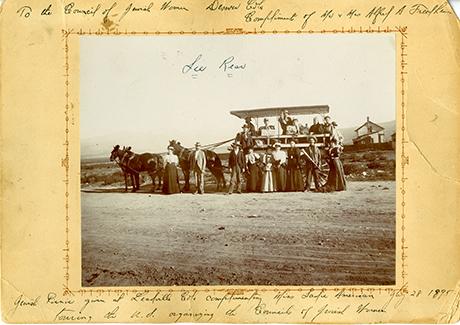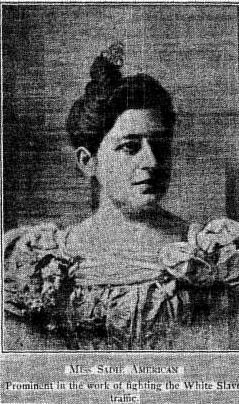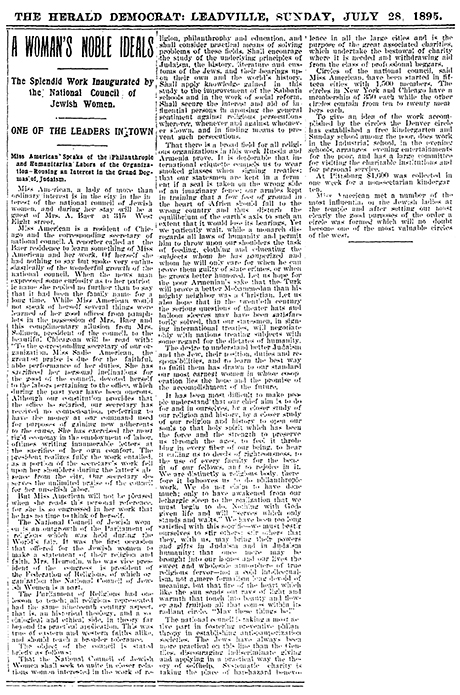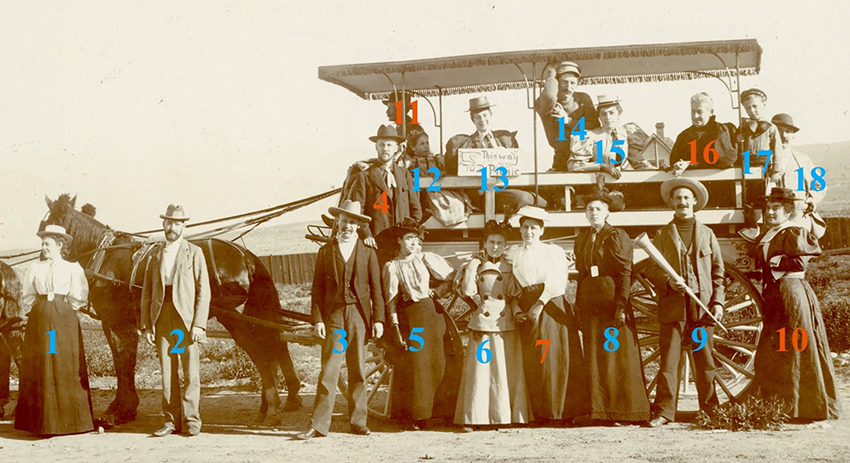SADIE AMERICAN of THE NATIONAL COUNCIL of JEWISH WOMEN SPEAKS AT TEMPLE ISRAEL
JULY 27, 1895
On the weekend of July 26-28, 1895, well-known Leadvillian Mathilda Baer hosted traveling dignitaries from the National Council of Jewish Women during their weekend visit to Leadville. [1] The events included an address by Sadie American to the Temple Israel congregation on Saturday July 27, 1895, and a kosher picnic held at Twin Lakes the following day.
Sadie American was a social activist of the Progressive Era of American politics. Born in Chicago during 1862, she was the only daughter of Jewish-German immigrant Otto American and his wife, Amelia. In her early years as an activist, American focused on both Jewish and non-Jewish social issues but during her early career she was primarily concerned with helping the community of impoverished German Jews on Chicago’s south side. American was one of the sixteen founding members and the active corresponding secretary of the National Council of Jewish Women. She was critical to the organization’s philosophical development which was credited with assisting Jewish-American immigrants’ transition to life in the United States among other social and philanthropic aims.
Sadie served as the organization’s executive secretary from 1905 to 1914. Her tenure was subject to criticism due to what was described as a “…sometimes brusque and autocratic style.” This would lead to the loss of her position in the national council in 1914 when her reelection bid failed, but she remained president of the organization’s New York chapter until 1916. [2]
The following is an article commemorating Miss American’s speech at Temple Israel on July 27, 1895, which is transcribed from the July 28 edition of Leadville’s Herald Democrat newspaper:
A Woman’s Noble Ideals
The Splendid Work Inaugurated by
the National Council of
Jewish Women
ONE OF THE LEADERS IN TOWN
Miss American Speaks of the Philanthropic and Humanitarian Labors of the Organization-Rousing an Interest in the Grand Dogmas of Judaism.
Miss American, a lady of more than ordinary interest is in the city in the interest of the national council of Jewish women, and during her stay will be a guest of Mrs. A. Baer (Mathilda) at 315 West Eighth Street.
Miss American is a resident of Chicago and the corresponding secretary of the national council. A reporter called at the Baer residence to learn something of Miss American and her work. Of herself she had nothing to say but spoke very enthusiastically of the wonderful growth of the national council. When the news man expressed some curiosity as to her patriotic name she reported no further than to say that it had been the family name for a long time. While Miss American would not speak of herself several things were learned of her good offices from pamphlets in the possession of Mrs. Baer and this complimentary allusion from Mrs. Solimen (actual spelling, Hannah G. Solomon), president of the council, to the beautiful Chicagoan will be read with: “To the corresponding secretary of our organization. Miss Sadie American, the greatest praise is due for the faithful, able performance of her duties. She has sacrificed her personal inclinations for the good of the council, devoted herself to the labors pertaining to the office, which during the past year have been onerous. Although our constitution provides that the office be salaried, our secretary has received no compensation, preferring to have the money at our command used for purposes of gaining new adherents to the cause. She has exercised the most rigid economy in the employment of labor, ofttimes writing innumerable letters at the sacrifice of her own comfort. The president realizes fully the work entailed, as a portion of the secretary’s work fell upon her shoulders during the latter’s absence from the city. Our secretary deserves the unlimited praise of the council for her unselfish labor.”
But Miss American will not be pleased when she reads this personal reference for she is so engrossed in her work that she has no time to think of herself.
The National Council of Jewish Women is an outgrowth of the Parliament of religions which was held during the World’s Fair. It was the first occasion that offered for the Jewish women to make a statement of their religion and faith. Mrs. Herrotin, who was vice president of the congress is president of the Federation of Religions, of which organization the National Council of Jewish Women is a part.
The Parliament of Religions had one lesson to teach: all religions represented had the same nineteenth century aspect, that is an historical theology, and a sociological and ethical side, in theory far beyond its practical application. This was true of eastern and western faiths alike, and should teach a broader tolerance.
The object of the council is stated briefly as follows:
The National Council of Jewish Women shall seek to unite in closer relations women interested in the work of religion, philanthropy and education, and shall consider practical means of solving problems of these fields. Shall encourage the study of the underlying principles of Judaism, the history, literature and customs of the Jews and their bearings upon their own and the world’s history. Shall apply knowledge gained in this study to the improvement of the Sabbath schools and in the work of serial reform. Shall secure the interest and aid of influential persons in arousing the general sentiment against religious persecutions wherever, whenever and against whomever shown, and in finding means to prevent such persecutions.
That there is a broad field for all religious organizations in this work Russia and Armenia prove. It is deplorable that international etiquette compels us to wear smoked glasses when signing treaties; that our statesmen are kept in a ferment is a seal is taken on the wrong side of an imaginary fence: our armies kept training that a few feet of ground in the heart of Africa should fall to the wrong country and thus disturb the equilibrium of the earth’s axis to such an extent that it would lose its bearings. Yet we patiently wait, while a monarch disregards all laws of humanity and permit him to throw upon our shoulders the task of feeding, clothing and educating the subjects whom he has pauperized and whom he will only care for when he can prove them guilty of state crimes, or when he grows better humored. Let us hope for the poor Armenian’s sake that the Turk will prove a better Mohammedan than his mighty neighbor was a Christian. Let us also hope that in the twentieth century the serious questions of theater hats and balloon sleeves may have been satisfactorily solved, that our statesmen, in signing international treaties, will negotiate only with nations treating subjects with some regard for the dictates of humanity.
The desire to understand better Judaism and the Jew, their position, duties and responsibilities, and to learn the best way to fulfil them has drawn to our standard our most earnest women in whose co-operation lies the hope and the promise of the accomplishment of the future.
It has been most difficult to make people understand that our chief aim is to do for and in ourselves, by a closer study of our religion and history to open our souls to that holy spirit which has been the force of strength to preserve us through the ages, to feel it throbbing in every fiber of our being, to hear it calling us to deeds of righteousness, to the use of every faculty for the benefit of our fellows, and to rejoice in it. We are distinctly a religious body, therefore it behooves us to do philanthropic work. We do not claim to have done much; only to have awakened from our lethargic sleep to the realization that we must begin to do. Nothing with God-given life and will “serves which only stands and waits.” We have been too long satisfied with this spiritic-we must bestir ourselves to stir others; stir others that they, with us, may bring their powers and gifts in Judaism and in Judaism humanity: that often there may be brought into our homes and our lives the sweet and wholesale atmosphere of true religions fervor-not a cold intellectualism, not a mere formalism being devoid of meaning, but that fire of the heart which like the sun sends out rays of light and warmth that touch into beauty and flower and fruition all that comes within its radiant circle, “May these things be.”
The national council is taking a most active part in fostering preventive philanthropy in establishing anti-pauperization societies. The Jews have always been more practical on this line than the Gentiles, discouraging indiscriminate giving and applying in a practical way the theory of self help. Systematic charity is taking the place of hap-hazard benevolence in all the large cities and is the purpose of the great associated charities, which undertake the bestowal of charity where it is needed and withdrawing aid from the class of professional beggars.
Circles of the national council, said Miss American, have been started in fifteen cities with 1,500 members. The circles in New York and Chicago have a membership of 350 each while other circles contain from ten to twenty members each.
To give an idea of the work accomplished by the circles the Denver circle has established a free kindergarten and Sunday school among the poor, does work in the Industrial school, in the evening schools, arranges evening entertainments for the poor, and has a large committee for visiting the charitable institutions and for personal service.
At Pittsburg $1,600 was collected in one week for a non-sectarian kindergarten.
Miss American met a number of the most influential of the Jewish ladies at the temple and after setting out most clearly the good purposes of the order a circle was formed which will no doubt become one of the most valuable circles of the west. [3]
The following day, July 28, 1895, the congregation held a kosher picnic at nearby Twin Lakes to commemorate Miss American’s visit. The photograph below includes thirteen of Leadville’s pioneer Jews.
Though not college educated, Sadie American is considered one of the pioneers of modern visual sociological technique. [4] She died at New York City on May 3, 1944. [5]

Cabinet card photo of the group headed to the Kosher Picnic near Twin Lakes (south of Leadville) on July 28, 1895.
Courtesy, Beck Archive of Rocky Mountain Jewish History, Special Collections, University of Denver Libraries.
Thyria Wilson, National Council of Jewish Women, Denver Section, Kosher Picnic at Leadville, Colorado, 1895 July 28. University of Denver Libraries. 2021.
The numbers above identify the people in the photo, listed below. Those in blue are part of the Leadville Jewish community, while those in red are not members of the Leadville Jewish community.
1 Personal Mention. (Leadville, CO: Herald Democrat). July 28, 1895. P4.
2 Martha Katz-Hyman,. Sadie American. Jewish Women: A Comprehensive Historical Encyclopedia. (Brookline, MA: Jewish Women's Archive). 1999.
3 A Woman’s Notable Ideals. (Leadville, CO: Herald Democrat). July 28, 1895. P3.
4 Stan C Weeber. Sadie American, Chicago's Pioneer of Visual Sociology. Lake Charles, LA: McNeese State University. 2008. Pp. 25-26.
5 Martha Katz-Hyman,. Sadie American. Jewish Women: A Comprehensive Historical Encyclopedia. (Brookline, MA: Jewish Women's Archive). 1999.
Bibliography
A Woman’s Notable Ideals. Leadville, CO: Herald Democrat. July 28, 1895.
Katz-Hyman, Martha. Sadie American. Jewish Women: A Comprehensive Historical Encyclopedia. Brookline, MA: Jewish Women's Archive. 1999.
Personal Mention. Leadville, CO: Herald Democrat. July 28, 1895.
Sadie American. [Digital Image: 12226]. Salt Lake City, UT: Project Guttenberg Literary Archive Foundation. 2011.
Weeber, Stan C. Sadie American, Chicago's Pioneer of Visual Sociology. Lake Charles, LA: McNeese State University. 2008.
Wilson, Thyria. National Council of Jewish Women, Denver Section, Kosher Picnic at Leadville, Colorado, 1895 July 28. [Digital Image: B063.04.0031.0009.00001]. Denver, CO: Beck Archive of Rocky Mountain Jewish History, Special Collections, University of Denver Libraries. 2021.
To cite any of the information in this biography, please use the following reference.
AUTHOR: Jeffrey P. Grant
EDITOR: William Korn
SOURCE: Social Activities/American
PUBLISHED BY: Temple Israel Foundation. Leadville, CO; USA. 2021.
STABLE URL: http://www.jewishledville.org/american.html





